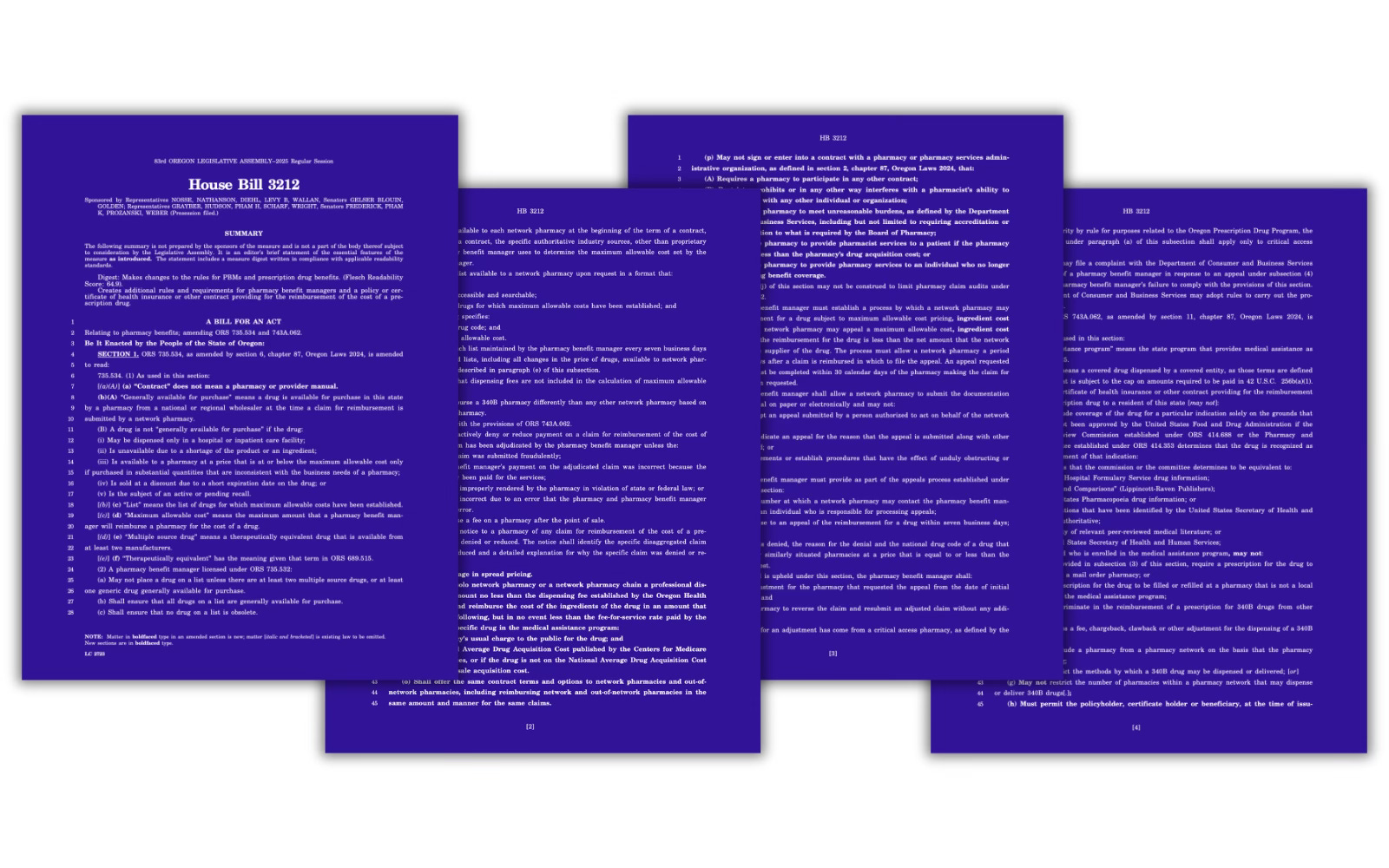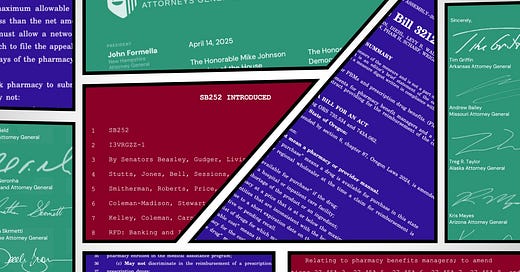State-By-State, America is Taking on Big Insurance’s Pharmacy Middlemen
While Congress continues to debate the growing power of pharmacy benefit managers (PBMs) in the prescription drug supply chain, several state legislatures and attorneys general are no longer waiting.
Last week we published a piece about how lawmakers in states like Alabama, Arkansas and California are fighting back against pharmacy benefit managers (PBMs) — the powerful middlemen owned by giant insurance companies.
In that piece, we emphasized something that’s too often missing from national coverage: that PBM reform isn’t just a federal issue. Much of the real progress is happening in state capitals — where lawmakers and attorneys general from both parties are stepping up to protect local pharmacists and patients.
States regulate many of the insurance plans PBMs operate under, and they’re uniquely positioned to respond to monopolistic business practices. Across the country, independent pharmacies are shuttering, patients are left without access to critical medications and insurance premiums keep rising — all while PBMs rake in massive profits by skimming from all sides of the prescription drug transaction.
Fortunately, the tide is turning all across the map — and the message is clear: State officials are no longer standing idly by while Wall Street giants crush local pharmacies and squeeze patients.
Alabama Takes Action
Earlier this month, Alabama Governor Kay Ivey signed SB252 into law after it unanimously passed in the statehouse. The law forces PBMs to reimburse independent pharmacies at the same rate as Medicaid, which will save independents from dispensing prescriptions at a loss due to low reimbursement rates by health insurers and their PBMs.

“This has been a win for the people of Alabama,” said State Sen. Billy Beasley, a retired pharmacist and sponsor of the bill. “It’s been a huge win for the community pharmacists…who just want to be able to go to work, make a living and take care of their patients.”
According to the Alabama Independent Pharmacy Alliance (AIPA), around 13% of Alabama pharmacies have closed since 2018. In rural communities where a local drugstore may be the only point of access to health care, these closures are nothing short of devastating.
Both the AIPA and the American Pharmacy Cooperative, Inc. applauded the passage of the law.
Oregon Fights Back Against ‘Pharmacy Deserts’
Thousands of miles away, Oregon is facing a crisis of its own. The state now ranks second to last in the U.S. for pharmacy access — just behind Alaska, according to the Oregon State Pharmacy Association. A new bill, HB3212, seeks to stem the tide of closures by giving pharmacists more leverage in negotiations with PBMs.

As Oregon Public Broadcasting reported, the legislation would require a minimum dispensing fee set by the Oregon Health Authority and allow pharmacists to reject filling prescriptions when the reimbursement doesn't cover their costs.
“It’s taken a toll on the pharmacies,” said Jeff Errol, CEO of Cascadia Pharmacy Group. “Greed knows no limits.”
As you’d expect, insurers and PBM-aligned groups are pushing back. A senior lobbyist for Regence BlueCross BlueShield, the second largest insurer in the state, said the bill would lead to higher drug costs and “be paid by members in premium increases.” Which is the usual song they sing. La, la, la. Blah, blah, blah.
Bipartisan AGs Demands Federal Action
While legislators are advancing reforms in the state capitols, a powerful chorus of state attorneys general is turning up the heat on Washington. In a letter sent this month to congressional leaders, more than three dozen AGs called on lawmakers to break up vertically integrated PBM-pharmacy-insurer conglomerates like UnitedHealth Group, CVS Health, and Cigna.

The bipartisan group — led by attorneys general from Arkansas, Massachusetts, Missouri, and Vermont — argued that these corporate giants use their ownership structures to inflate prices, restrict competition, and steer patients to their own affiliated pharmacies. “PBMs have overtaken the market and now wield outsized power to reap massive profits at the expense of consumers,” the letter read, according to Modern Healthcare.
The Federal Trade Commission has found that top PBMs often pay more to their own pharmacies than to independents — a tactic that can quietly destroy local competition. The attorneys general are calling for structural separation to restore fair market conditions.
“PBMs should be prohibited from having direct ownership ties to the parties they purport to be bridging,” they wrote. “This requirement would allow pharmacies to compete on fair terms and create a market that is more accessible to consumers.”
The AGs letter to members of Congress will add to the sense of urgency on Capitol Hill to finally enact federal legislation that would protect patients and pharmacists in every state. It might be exactly what finally breaks the grip that Big Insurance and its pharmacy middlemen have enjoyed for years in Washington.
In Closing
What’s remarkable is just how bipartisan this movement has become. In Alabama, a Republican governor and a Democratic pharmacist-legislator joined forces. In Oregon, Democrats and Republicans alike are backing reforms. And across more than 35 states, AGs from both parties are demanding action.
For more, see below for recent stories we’ve published regarding state and federal actions on PBMs:
There is a Rebellion Against PBMs in State Capitals, Not Just in Washington - APR 15, 2025
Who Killed the Corner Drug Store? In One Ruby Red State, PBMs Are Under Fire - APR 10, 2025
How PBMs Took Over the Prescription Drug Chain — And Left Patients and Pharmacists Paying the Price - APR 02, 2025
There is a Bi-Partisan Bill to Rein in PBMs and Lower Drug Costs. It’s a Step in the Right Direction. - MAR 26, 2025






Price spreading, patient steering, complexity, lack of transparency, and flat-out greed have sadly led to a ridiculous pricing system for pharmaceuticals in America while devastating independent pharmacies. We need transparency and legislation that would lead to the elimination of PBM's egregious misbehavior. The government, yes, the government, should negotiate drug prices so that Americans are getting the best value on medications without compromising our health.
The solution is to do what most countries have which is universal healthcare and to open up pharmacies like in Mexico. Where u can buy over the counter meds like a bottle of antibiotics for a fraction of the cost and don’t need a prescription.